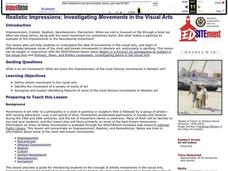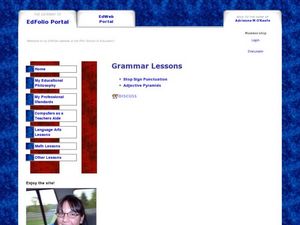Charlotte Mecklenburg Schools
Honesty
Get your youngsters talking about what it means to be honest, and how difficult it can be to try to cover up the truth, with one of the several collaborative activities listed in this resource.
University of Oklahoma
Increasing My Self-Awareness
After watching a PowerPoint about famous people with disabilities, class members begin a Self-Awareness research project about their own abilities and disabilities. Included in the project is information about people who have similar...
Curated OER
On the Road with Marco Polo: Homecoming
Students role play as Marco Polo to detail his travels. They include the terrains, foods, religions, people and cultures that were encountered. They write a journal entry as if they were Marco Polo detailing one aspect of his travels.
Curated OER
Exploration of "Pillbugs"
Fifth graders define vocabulary terms, identify the characteristics of a pillbug, and create a dichotomous key. Then they examine the pillbugs and make observations and record these observations. Finally, 5th graders observe specific...
Curated OER
Role Models
First graders identify heroes by researching their family history. In this personal heritage lesson, 1st graders define the term "hero" and the characteristics that represent it. Students research family resources and family trees in...
Curated OER
Realistic Impressions: Investigating Movements in the Visual Arts
Students explore the idea of movements in the visual arts and differentiate between some of the most well known movements in Western art. The lesson focuses on what makes a painting an example of a particular movement.
Curated OER
Of Human Bondage
How does the particular point of view in a situation affect the way it is presented? Focusing on perspectives on slavery during the Civil War, middle schoolers use research to write narratives from the points of view of their historical...
Curated OER
Portraits, Pears, and Perfect Landscapes: Investigating Genre in the Visual Arts
Students define genre in the visual arts, particularly in Western painting and explain the differences between subject and genre. The genre of a variety of works of art is identified.
Curated OER
Investigation Designing a Patchwork Quilt
Fourth graders practice calculating area by creating a classroom quilt. Students are given a 6x6 inch square material they design based on a classroom theme. A sample of the class quilt is created using graph paper so students may...
Curated OER
PE Word Wall
Increase your middle schoolers' physical education vocabulary and knowledge of the rules of different sports by posting on the word wall. You will have to do all the work and remember to laminate things, so you only have to do it once. A...
Curated OER
Like It Or Not?
Write a review of the film adaptation of Holes. After viewing the film, your young reviewers make recommendations about viewing the film. Using details to support their opinions, they highlight the important parts of the movie without...
Curated OER
Double-Entry Journal Writing
Introduce your learners to the concept of a double-entry journal. Talk about how to connect with the text and model an example for them. Using whatever literature you are working with, have scholars choose a quote and make their own...
Curated OER
The Civil War Through a Child's Eyes
Middle schoolers focus upon the Civil War era using research methods of drawing information from primary sources. Literature and photographic images reflect, communicate, and influence human perspectives of historical events. The lesson...
Curated OER
Tru Confessions
Students view the movie "Tru Confessions" about the life of teenagers. They participate in activities in which they analyze themselves. They record their thoughts and feelings to be analyzed at a later date.
Curated OER
Stop Sign Punctuation
Learners use punctuation and capitalization. In this grammar lesson students use stop signs in the place of periods. Learners cut out sentences and put stop signs in appropriate places. Students indicate capitalization where needed.
Curated OER
What is Your Story?
Young scholars listen to Picnic In October and Memory Coat to explore the concept of memoirs. They interview a family member and write a personal memoir that reflects their own family history.

















